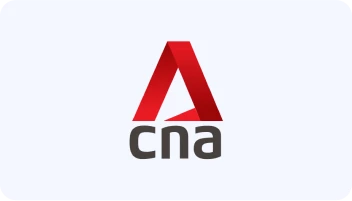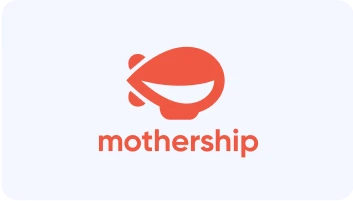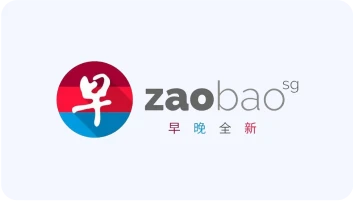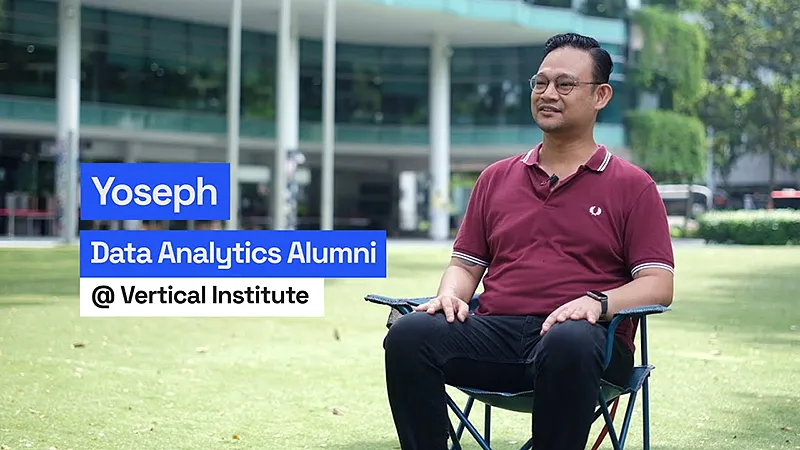Introduction to Data Analysis Course Tailored for Beginners
Dive into the world of data analysis with confidence. Get hands-on with tools like Excel, SQL, and Tableau from expert data analysts in Singapore.
Book a call with our team

Other ways to reach us
Other ways to reach us
Our Data Analytics course graduates come from industry-leading companies.
Kickstart Your Journey into Data Analysis

Singapore is bustling with top companies hungry for data-driven insights. Being able to interpret and analyse this data is becoming increasingly essential. You must take advantage of these foundational skills to avoid falling behind. Now’s the perfect time to begin your journey with tools like Excel, SQL, and Tableau. Produce insightful visualisations and dashboards that can influence decision-making.
Vertical Institute’s Introduction to Data Analysis course alumni have made their mark across various sectors. Graduates are in high demand, from tech giants like Oracle and LinkedIn to e-commerce leaders like Lazada and more.

Possible Career Pathways for Data Analytics:
Data Analytics Course Details
Class Details and Support
7 lessons, 3 hours each lesson
Online classes via Zoom
1 Instructor, 1-2 Teaching Assistants
Live Q&A sessions
Close mentorship and guidance from instructors
Weekly free consultation slots
Capstone project feedback from instructor
Out of class support from TAs and instructor
Why Beginners Prefer VI’s Introduction to Data Analysis Course
Beginner-Friendly
Launch your data analysis journey with this course, specifically tailored for beginners.
Professional Certificate
Acquire a recognised Data Analytics Certification in Singapore.
Expert-led Learning
Grasp foundational concepts and tools through engaging lectures, lively discussions, and hands-on projects
Personalised Feedback
Receive individualised feedback and support from your instructional team with free 1-on-1 consultations
Capstone Project
Apply what you’ve learned to create a capstone project solving a real-world data problem
Community Benefits
Be part of the VI community where members can leverage connections with alumni, instructors and experts
Career Support
Dedicated career support and matching with hiring partners
Hands-on Training
Fully hands-on training with industry tools
Data Analytics Course Curriculum
Pre-Work
As a VI student, you will be given access to online learning materials in our e-learning portal.
To get you ready for learning, this essential pre-work will familiarise you with the basics of the key concepts and tools we will be using throughout the course.
Although you will learn these topics remotely before you arrive in class, you won’t be far away from the resources of the VI community. Make use of our Telegram channel to leverage connections with students, alumni, instructors and experts. At the end of your pre-work, you’ll be ready for the fast pace on campus!
After the course, you can choose to participate in follow-up sessions with your instructor, either in a group and/or individually, included as part of the course fee.
Module 1: Data Analysis & Excel Fundamentals
Tutorials:
- Introduction To The Course
- The Data Analysis Process
- Introduction To Data Visualisation
- Pre-attentive vs Attentive Processing
- Good And Bad Visualisation Practices
- Data Referencing, Aggregation And Analysis With Excel\
- VLookup
- Pivot Table
- Pivot Chart
Module 2: Introduction to SQL & Databases
- Introduction To SQL & Databases
- Database Connection
- SQL Syntax
- SQL Aggregation Functions
- Count, Sum, Group By, Having and Where
Module 3: SQL Fundamentals
- Combining Data in SQL
- JOIN Function
- Inner, Outer, Left, Right and Full JOINS
- UNION Function
- Applying SQL Functions
- String, Math & Date Functions
- Using Logic In SQL
- Conditional Expressions
Module 4: Data Visualisation Fundamentals
Tutorials:
- Introduction To Data Visualisation
- Data Visualisation Tools In The Industry
- Introduction to Tableau
- Charts & Table Calculations
- Bar Chart
- Quick Table Calculations
- Line Chart
- Area Chart
Module 5: Data Analysis With Tableau
- Data Analysis Techniques With Tableau
- Segmentation Analysis
- Groups, Sets
- Difference between Groups & Sets
- Combine Sets
- Bins
- Investment Scenario & What-If Analysis
Module 6: Dashboards & Storytelling With Tableau
- Dashboard Creation & Storytelling
- Investment Analysis Dashboard
- Create Maps
- Interactive Dashboards
- Table Calculations
Module 7: Advanced Tableau & Capstone Project
- Advanced Analytics With Tableau
- Data Blending
- Scatter Plot Animation
- Level Of Detail (LOD)
- Tableau Server
- Capstone Project Discussion
The Capstone Project
Participants will be required to address a data-related problem using a real-world dataset. You will acquire a real-world dataset, then prepare, clean, and analyse it to draw meaningful conclusions.
The individual open-book capstone project will culminate your learning by applying the new tools and concepts learnt to create a portfolio project that includes:
- A summary of the data acquisition, cleaning, and parsing stages.
- A clear visualisation or dashboard that displays insights both numerically and graphically.
- A description of high-level insights and resulting actions that are relevant to key stakeholders.
View our alumni portfolio projects.
Course Fee & Government Subsidies
Upskill with ease, take course fees off your mind with government subsidies.
Pay even less or 0 cash with additional support 🎉
All Singaporeans aged 25 years old and above can use their SkillsFuture Credits to fully offset the remaining fees after funding.
In addition, NTUC members can utilize UTAP to offset 50% of remaining fees (capped up to $500 per year).
Data Analytics Course Schedules
Choose from our flexible course schedules outside working hours. We have timeslots available on weekday evenings or on weekends.
How to Apply in 3 Simple Steps
Select Class Schedule
Choose convenient classes on evenings or weekends.
Calculate Your Subsidies
Fill out the form to calculate your government subsidies.
Pay $50 Deposit To Secure Your Spot
Instead of paying the full fee, place a small deposit to secure your slot.
Meet our Instructors

Clarence
Analyst @ Google
Master’s in IT Business (Analytics)
Singapore Management University

Lindsay
Data Analyst @ Foodpanda
Bachelor’s in Mathematical Science
Nanyang Technological University

Beverly
APAC Fraud Lead @ Stripe
Double Bachelor’s in Acc & Biz
Nanyang Technological University

Stan
Data Scientist @ Standard Chartered
Master’s in Computing
National University of Singapore

Zane
Chief Technology Officer @ Worq Health
Masters in Knowledge Engineering, NUS
BEng in Aerospace Engineering, NTU

Sifat
Analytics Consultant @ SIFT Analytics
Bachelor’s in Engineering Singapore
University of Technology & Design

Hong Lin
Head of Business Intelligence @ Ant Financial
M.Sc, Bachelor’s in Engineering
Nanyang Technological University
Data Analytics Course Reviews
Currently working at Amazon Web Services (AWS), this course has equipped me with Data Analytics skills needed for my tech career!
Marcella Tang
Job Placement Assistance
Vertical Institute offers Job Placement Assistance to graduates that have successfully completed any of our courses.
Over 1000 hiring partners
Land internship & industry opportunities
Apply your new skills learnt
Need Clarification? We’re Here to Help
What is Data Analytics?
Data analytics encompasses the systematic process of collecting, transforming, organising, analysing, and interpreting data to derive meaningful insights that enable enhanced decision-making. This intricate field employs a myriad of techniques and tools, necessitating that data analysts possess robust knowledge of statistics, machine learning, and predictive modeling. While data analytics stands as a potent resource for businesses, it is imperative to wield it ethically and responsibly.
Below are some of the salient benefits that data analytics can bestow upon businesses:
Enhanced Customer Service:
Data analytics allows businesses to discern customer trends and preferences, empowering them to refine and elevate their customer service initiatives.
Streamlined Operations:
Through data analytics, businesses can pinpoint areas ripe for improvement within their operations—whether that involves cost reduction or boosting efficiency.
Informed Strategic Decisions:
Data analytics aids businesses in making astute strategic decisions, such as recognising emerging market opportunities or evaluating the potential risks associated with launching a new product.
Competitive Edge:
Data analytics can furnish businesses with unique insights, granting them an edge over competitors who lack access to such valuable information.
“The rise of the digital economy will drive up the demand for tech jobs – among others, we will need data analysts, software developers, infrastructure architects, and cyber security engineers.”
– Manpower Minister Tan See Leng, 16 Dec 2021
Are there course fee subsidies available?
Yes, you can receive up to 70% funding support from The Institute of Banking & Finance (IBF) for our IBF-accredited programmes. The balance course fees (after subsidy) can be offset using your SkillsFuture Credits or NTUC UTAP funding.
The IBF Standards Training Scheme (“IBF-STS”) provides funding for training and assessment programmes accredited under the Skills Framework for Financial Services.
For our training programmes that are IBF-accredited, eligible Singaporeans & PRs may receive funding support under the IBF Standards Training Scheme (IBF-STS), subjected to all eligibility criteria being met.
For more information on the funding support, please visit: https://www.ibf.org.sg/home/for-individuals/skills-and-jobs-development/training-support/IBF-STS
Can I use SkillsFuture Credits to pay for the remaining course fee after funding?
Yes. For self-sponsored Singaporeans aged 25 years old and above, you can use your SkillsFuture Credit to offset the remaining course fees after IBF funding.
To check your SkillsFuture credit balance, please follow these steps:
- Go to https://myskillsfuture.gov.sg
- Click on ‘Submit SkillsFuture Credit Claims’
- Login with your SingPass
- Click on the arrow (>) at the top right hand corner. You will be able to see a drop-down list of your Available SkillsFuture Credits.
- Please note that our bootcamps are not eligible for “Additional SkillsFuture Credit (Mid-Career Support)’. You will only be able to use available credits from ‘SkillsFuture Credit’ and ‘One-off SkillsFuture Credit Top-Up’.
After you have registered for a course, a VI representative will reach out to guide you with the SkillsFuture Credits claim application.
Can NTUC Union members use UTAP to offset the remaining course fee after funding?
Yes, all our courses are eligible for Union Training Assistance Programme (UTAP) Funding. NTUC Union members can use UTAP to offset 50% of unfunded course fees (capped at $500 per year).
This claim must be done after completion of the course. Please refer to the UTAP FAQ for more information.
Can I use SkillsFuture Credits and UTAP at the same time?
Yes, you can utilise both at the same time. UTAP can only be applied after SFC has been applied.
For illustration purposes only:
Am I eligible for IBF funding support?
The IBF funding support works on a nett fee model. This means that the subsidy is applied upfront, and you will only need to pay the balance course fees after the subsidy. For example, if you are eligible for 70% subsidy, you only need to pay the remaining 30% upfront.
To be eligible, you’ll have to meet the following prerequisites.
For Self-Sponsored:
All Singaporeans or Singapore Permanent Residents (PRs) that are physically based in Singapore and successfully complete the course will be eligible.
- Be a Singaporean Citizen or PR based in Singapore
- Minimum of 75% attendance (this means that you must attend at least 6 out of 7 lessons)
- Pass the final assessment
Any balance course fees can be offset using your SkillsFuture Credits & NTUC UTAP funding.
For Company-Sponsored:
- Be from Financial Institutions that are regulated by the Monetary Authority of Singapore (MAS) (either licensed / exempted from licensing) or Fintech companies that are registered with the Singapore Fintech Association.
- Be a Singaporean Citizen or PR physically based in Singapore
- Minimum of 75% attendance (this means that you must attend at least 6 out of 7 lessons)
- Pass the final assessment
Are there instalment plans available?
We offer interest-free instalment plans to ensure tech education is accessible to all Singaporeans and PRs. You may reach out to our admissions team for more information via:
Email: [email protected]
Phone: 6950 7023
Are there any pre-requisites for this course?
This program is suitable for beginners with no pre-requisites.
Is there a data analytics certificate granted at the end of the course?
Upon successful completion of this IBF-accredited course, participants will be awarded a data analytics certification recognised by employers in Singapore. VI alumni use their course certificate to demonstrate skills to employers and their LinkedIn network.
Our programmes are well-regarded by top companies, who contribute to our curriculum and use our courses to train their own teams.
What is Tableau?
Tableau is one of the most powerful and fastest growing data visualisation tools used in the Business Intelligence industry. It helps in simplifying raw data into easily understandable formats to derive actionable results. It is becoming one of the most useful tools for any business organisation.
It has an easy to use drag and drop interface to build beautiful visualisations easily and in a short amount of time. Visit the Tableau Public Gallery to see beautiful real world projects by Tableau users.
What is SQL?
What softwares do I need to download?
In the data analytics course, you will be learning 3 key industry tools: Excel, SQL and Tableau.
You will need to have your own personal laptop/PC to attend the bootcamp.
The SQL portion will be web-server based, hence no installation is required. You will only need to download Tableau Public, which is free and easy to download.
Your instructional team will guide you step-by-step on the installation process.
What if I cannot attend a class?
If you miss a lesson, you are allowed to attend a makeup class. This would be the corresponding class of another intake that same week, subject to availability. If you cannot make it for the makeup class, then you can simply watch the recorded lesson video.
Your attendance is only counted if you attend a makeup class.
Why are data analytics skills relevant today?
‘Singapore Tech Salaries May Soar Up to 30% in Two Years’ – The Straits Times, 2022
As market competition stiffens, top organisations are turning to data analytics to identify new market opportunities and provide insights to make critical business decisions.
To thrive in today’s business landscape, it is crucial to pick up industry tools such as Excel, SQL, and Tableau. Learn how to analyse and make insightful conclusions from raw data. Develop visualisation skills to create dashboards and effectively share your findings.
With data analytics skills, you will gain an in-demand and marketable skillset that can be applied to virtually any industry or profession.
Kickstart a career in Data Analytics with the beginner-friendly Data Analytics Bootcamp by Vertical Institute. The course allocates 3-4 instructional team members per class to ensure dedicated peer and mentor support for your Data Science journey. You will graduate with an IBF-accredited Data Analytics certification, as well as a polished, portfolio-ready project to showcase your analytical and visualisation skills.
What are the other in-demand courses at Vertical Institute?
Apart from the Data Analytics Course, Vertical Institute presents numerous in-demand courses in Singapore. These are additional pathways that you can consider to carve out a career in the tech industry.
- Cybersecurity Course
- Digital Marketing Course
- Blockchain & Cryptocurrency Course
- UX Design Course
- Advanced Data Analytics Course
With these resources, students have the opportunity to cultivate their tech skills and set a strong foundation for a successful career in the ever-evolving technology industry. Singaporeans and PRs are eligible for government course subsidies at Vertical Institute.
What is Data Analytics?
Below are some of the salient benefits that data analytics can bestow upon businesses:
Enhanced Customer Service:
Data analytics allows businesses to discern customer trends and preferences, empowering them to refine and elevate their customer service initiatives.
Streamlined Operations:
Through data analytics, businesses can pinpoint areas ripe for improvement within their operations—whether that involves cost reduction or boosting efficiency.
Informed Strategic Decisions:
Data analytics aids businesses in making astute strategic decisions, such as recognising emerging market opportunities or evaluating the potential risks associated with launching a new product.
Competitive Edge:
Data analytics can furnish businesses with unique insights, granting them an edge over competitors who lack access to such valuable information.
“The rise of the digital economy will drive up the demand for tech jobs – among others, we will need data analysts, software developers, infrastructure architects, and cyber security engineers.”
– Manpower Minister Tan See Leng, 16 Dec 2021
Can a beginner transition into data analysis?
Yes, a beginner can transition into data analysis. With the proper training and resources, anyone can learn the skills and knowledge needed to become a data analyst.
VI’s Introduction to Data Analysis course is a great place to start. The course covers the basics of data analysis, including data cleaning, data visualisation, and statistical analysis. You will also learn to use popular data analysis tools like Excel, SQL, and Tableau.
In addition to taking a course, you can learn data analysis by doing. Many online resources are available where you can practise your skills on real-world data sets.
The most important thing is to be persistent and never give up. Data analysis is a challenging field, but it is also enriching. With hard work and dedication, you can achieve your goal of becoming a data analyst.
What does a data analyst do?
A data analyst is a professional who uses data to solve problems and make decisions. They collect, clean, analyse, and interpret data to find patterns and trends. Data analysts use their findings to help businesses improve their operations, products, and services.
Here are some of the tasks that a data analyst might do:
- Gather data from various sources, such as databases, surveys, and social media.
- Clean and prepare the data for analysis, removing errors and inconsistencies.
- Use statistical and machine learning techniques to analyse the data.
- Create data visualisations to communicate the findings of the research.
- Present the results to stakeholders and recommend solutions.
How do I begin my journey in data analysis?
To begin your journey in data analysis, start with the basics. Learn about data cleaning, data visualisation, and statistical analysis. Start with Vertical Institute’s Introduction to data analysis course. The course will help you understand the tools, skills, and best practices to become a data analyst. We cover everything from data cleaning to data visualisation and provide you with hands-on experience working with real-world data sets
What benefits does data analysis offer?
Data analysis is a valuable skill that can help individuals position themselves as valuable assets in leading companies. VI alumni have used their data analysis skills to land jobs at top companies like Oracle, LinkedIn, and more.
Here are some additional benefits of data analysis:
- Improve customer satisfaction: By understanding customer behaviour, businesses can improve their products and services to meet customer needs better.
- Increase sales: Data analysis can help businesses identify new markets and target customers more effectively.
- Reduce fraud: Data analysis can help businesses detect and prevent fraud.
- Improve compliance: Data analysis can help businesses comply with regulations
If you want to improve your career prospects, data analysis is a valuable skill to learn today.
Got another question?
Are you ready to skyrocket your career and income potential? 🚀

Without the right qualifications, standing out in Singapore’s competitive job market becomes a challenge. With Vertical Institute, you can get certified in high-demand tech skills in just 21 hours! 🕒
Get in touch to find out more today! 🎉

Featured on
As Featured on Channel NewsAsia with the DPM Lawrence Wong
Vertical Institute Instructor Clarence chats with DPM Lawrence Wong on upskilling.






Our instructors and students come from top companies
At Vertical Institute, we unite a diverse community of learners and instructors from global industry leaders. Our courses offer a unique chance to learn from experts, network with professionals, and gain insights from top-tier organizations.














